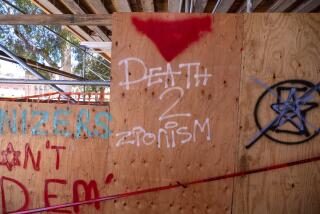Separation Anxiety of Church and State : Israel: The defining interests of government and religion run counter to each other, so how can there be a Jewish state?
- Share via
In sentencing Yigal Amir, the slayer of Israeli Prime Minister Yitzhak Rabin, to life in prison, the judge, a respected Talmudic scholar, reminded us that Amir’s cruelty was a premeditated attack by a lawless Jew, not, as the accused claimed, a commandment required by Jewish law. While Amir’s mad act may have been the work of an isolated individual, his zealotry blossomed in the heated rhetoric of a deeply divided Israeli society.
Rabin’s murder will always be a deep and tragic scar in Israeli and Jewish history. But whether it will transcend to something else depends on the willingness of Israelis and Israel’s supporters to explore how political violence is related to extremism in Israeli society and government.
The experience of Jews in America can be instructive. At an important meeting on Jewish unity sponsored by the American Jewish Committee, a panelist called for the establishment of a truly Jewish democracy in Israel as the best means to forestall the growing rift between Jew and Jew, Israeli and Israeli.
While many nodded sagely at this observation, others did not. Substituting the word “Christian” for “Jewish” immediately explains why. If the Jewish experience in America has taught anything, it is that an alliance of religion and state represents a threat to individual security and pluralist democracy.
Obviously, public life cannot be lived in a moral vacuum. Matters of conscience cannot and should not be excluded from the public square. It is both inescapable and also appropriate that our faith communities should argue and press their viewpoints on whatever issues engage their concerns and passions, or speak to their fundamental articles of faith. Yet, insistence on one’s view because it has divine sanction, no matter how noble the cause, risks shifting the public debate from fierce conviction to fiery intolerance. In public affairs, it is imperative to guard against scriptural certainty every bit as vigorously as ideological dogmatism must be resisted.
There is a fundamental, inescapable difference between the cathedral and the marketplace. The certitude of religious values--truths received through the revelation of religious authority--are not ever subject to compromise. The certainty of the cathedral is not conditional and not debatable, for it speaks to the ineffable nature of God and his relationship to humankind.
The marketplace, however, is quite different, for its realm is the relationship of each of us to our neighbor. The political process is always weighing, measuring, making choices among competing just claims. Given the inexactitude of human relations and behavior, compromise is the very essence of the political process.
Where this crucial distinction is not maintained, the churning together of secular and spiritual passions ensues, sweeping before them civil order, respect for the rule of law, pluralism and tolerance, leaving in their wake either civil and religious strife or political fundamentalism that blights too many nations in the world today.
Without question, the sharpness of the political debate in Israel arises from the life-and-death nature of the challenges the state faces, the dangers that have surrounded it throughout its entire history. Yet, it also must be acknowledged that the intensity and fragmentation of civic life in Israel is directly related to and gravely magnified by the absence of any principle of separation between the state and the religious authorities.
Can anyone seriously doubt that the climate in which Rabin was assassinated was mired in religious passions about the sanctity of the land and the sin of withdrawal from any part of it? However deeply and sincerely held these views, they reflect an uncompromising theological language that has no place in a pluralist democracy. And to enmesh the language of the synagogue that informs absolute, fundamental belief with the language of the state that moderates and accommodates behavior is to prescribe tragedy.
In the days and weeks ahead, as Israelis debate the nature of their society and select a government to lead it, one hopes that they will look in their faith for ethical models, not for mandates governing their actions.
More to Read
Sign up for Essential California
The most important California stories and recommendations in your inbox every morning.
You may occasionally receive promotional content from the Los Angeles Times.













